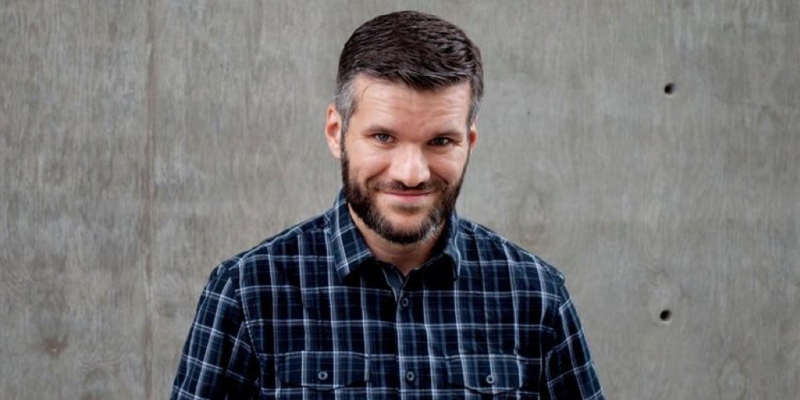Time, Trump, and Trauma: Matt Bell on Living on a Political Mobius Strip
Matt Bell in Conversation with Whitney Terrell and V.V. Ganeshananthan on Fiction/Non/Fiction
Writer Matt Bell joins co-hosts V.V. Ganeshananthan and Whitney Terrell to discuss the eerily familiar run-up to the 2024 presidential race, as well as his latest novel, Appleseed. Referencing his recent craft book, Refuse to Be Done, Bell talks about how literature frequently uses repetition and non-linear chronology to mimic the experience of trauma. He also explains how expanding Appleseed’s timeline helped him to consider the possibility of redemption after disaster.
Check out video excerpts from our interviews at Lit Hub’s Virtual Book Channel, Fiction/Non/Fiction’s YouTube Channel, and our website. This episode of the podcast was produced by Anne Kniggendorf, and edited Hannah Karau.
*
From the episode:
V.V. Ganeshananthan: So, we’re taping this on May 20th, and the GOP will nominate a presidential candidate a year and change from now. And so far, Trump is in the lead, ahead of Florida Governor Ron DeSantis. He’s leading by like 36 percent, so the odds of a Trump-Biden rematch next year seem high. Some current polling shows them virtually tied in a general election.
I can’t think of any presidential election rematches like this in my lifetime. Of course, the story isn’t exactly the same. They’ve flipped roles and Biden is the incumbent, while Trump is a challenger, and Trump was also just found liable for sexual abuse and defamation of E. Jean Carroll. An incumbent president ousted from the White House hasn’t returned to the office since Grover Cleveland. He was our 22nd and 24th President. How are you feeling about our weird, familiar sequel?
Matt Bell: Awful, obviously. I was thinking about this earlier today, and I listen pretty religiously to Pod Save America, like, two times a week. It’s one of the places I get my political news, and I was thinking, as they were discussing something about Trump’s run for president the other day, that I’ve kind of been listening to the same episode of it for eight years. The exact same episode of Pod Save America has been on since 2016, which is grueling, and it is sort of weird to be in it again. I’m hoping, like most sequels, Trump’s performance will just keep getting worse. But it is a scary time, right? That sort of even match between him and Biden seems alarming, but not terribly surprising.
Whitney Terrell: The other thing that messes with the way that we perceive time—and we’re going to talk about the way that works in literature as well—but it’s when people are basically blowing by all norms. That’s the thing that has been repeated with Trump over and over again: the Muslim ban, it seems so familiar, but that happened at the beginning of his first term, and the separation of migrant families, too.
He’s already saying, in that recent CNN Town Hall, and The New York Times has been reporting on this as well, for the default on the debt, he would stop supporting Ukraine, he would destroy the Federal Civil Service, and he would pardon people connected to January 6. It’s all the same crazy crap that you got the first time around. How do we deal with this sense that we’re not moving forward in time? What happens to people when that occurs to them?
MB: I was trying to think about similarities and differences as I was getting ready for this conversation. He said he’s going to destroy the federal civil service. I don’t know if you remember, at the beginning of his first presidency—his only presidency, hopefully—there were around 2,500 unfilled federal jobs for awhile. He just wasn’t putting people in positions.
It felt like it was a failure of competency at first, like he didn’t know how to do it. And then you realize, maybe that’s actually the plan. If you just don’t fill regulatory roles, you just don’t put people in position to run things, then the government just doesn’t work. Maybe it’s the goal of a lot of the Republican Party, not just Trump. So that feels like a repeat. We’ve lived in that version of the federal government once, and we wouldn’t want to do it again.
I was thinking about what was different. I don’t know how this worked out electorally, but certainly after 2020 and the expansion of Black Lives Matters, a lot of activist feeling and capacity in the U.S. expanded. We have that this time that we did not have last time in the same way. That seems true. I think the primary that Biden won moved the Democratic Party to the left really firmly in a way that we actually got a lot of progressive things through. I think that level of where we expect the left to be has expanded in capacity, and we’re seeing some of the results of those things. I’m hoping that those things are bulwarks against this sort of repeat of Trumpism, but we’ll see. I can take a little optimism there, at least because the capacity for resistance is higher than it was in 2016.
VVG: I think that’s a really helpful reminder. So profoundly true. As someone who lives in Minneapolis, I’ve seen people becoming active and reaching for things that they hadn’t tried before, or moving into spaces where they weren’t comfortable because they’re doing it for things that are important.
WT: I keep thinking about the Dark Tower trilogy, some books by Stephen King where there’s that image of the Red King that gets all these telekinetic people together to dismantle the beams that are connecting all the different universes together. They’re slowly eroding reality away. And like, in certain worlds, there are places called “thinnies” where the reality has begun to erode away, it makes weird noises, and you don’t want to go near it. That’s what I feel like Trump is doing, like he’s got a bunch of people who are slowly eating away at the norms of American society. How he wasn’t filling the civil service, and pretending that the election wasn’t accurate, all that stuff is eating away. That’s what I feel like is happening.
MB: Yeah, I don’t disagree with that. I’m listening to Jon Krakauer’s book about Pat Tillman, partly because that’s an Arizona story I don’t know very well (as someone who now lives here). A lot of that is post-9/11 politics and post-9/11 geopolitics. So much of that was handled really badly. And it feels quaint in some ways, compared to our current political discussions.
For example, no one wants to repeat a George W. Bush either. It’s amazing how nostalgic even that version of Republican politics seems. It seems impossible to have a Republican presidential candidate that would look anything like that now, other than just general incompetency, which they still are doing quite well with. It does feel that erosion is a hard thing to deal with and to push back against. It is hard to feel how that’s affected you because I absolutely feel that, too.
VVG: Yeah, I feel like you’re already helping. As I was thinking about this, my brain has shrunk to: “Oh, there’s 2016, there’s 2020, and there’s 2014.” Like there isn’t anything right before that, right? But W. makes Trump possible.
WT: Yeah, I have a whole theory on that. But it’s because he was such a bad president, you know. He created this war that so many of his voters supported and then sent their children to fight and die in it, and then there was no resolution for it. So the anger and humiliation of supporting a thing that was a disaster, you can’t admit is a disaster, it makes people crazy. And I think Trump is a direct outgrowth of that.
• Appleseed • Refuse to Be Done • A Tree or a Person or a Wall • Scrapper • In the House Upon the Dirt Between the Lake and the Woods
Others:
• The Dark Tower by Stephen King • Where Men Win Glory by Jon Krakauer • Losing Music by John Cotter • Time’s Arrow by Martin Amis • Catch-22 by Joseph Heller • Beloved by Toni Morrison • The Ones Who Walk Away From Omelas by Ursula Le Guin • The Monster at the End of This Book by Jon Stone and Michael Smolli • “Rhyming Action” by Charles Baxter • Hyperobjects by Timothy Morton • The Unsettling of America by Wendell Berry • Eleutheria by Allegra Hyde • The Great Transition by Nick Fuller Googins • Trump Town Hall Shows His Second-Term Plan: Shattering Even More Norms – The New York Times • Pod Save America | Crooked Media




















